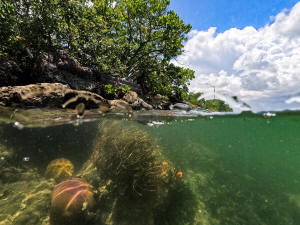Countries pledge to raise $12 billion to fund coral reef protection
 Send a link to a friend
Send a link to a friend
 [October 03, 2023]
By David Stanway [October 03, 2023]
By David Stanway
SINGAPORE (Reuters) - An alliance of nations said on Tuesday members
would raise $12 billion to protect coral reefs from threats such as
pollution and overfishing, but experts warned the funding would only be
a drop in the ocean unless broader climate risks are addressed.
The International Coral Reef Initiative (ICRI) said it would secure
public and private investment to help conserve and restore coral
ecosystems, which sustain a quarter of the world's marine species and
more than a billion people.
"The functional existence of these critical ecosystems is at stake due
to the climate crisis and a myriad of other anthropogenic stressors," it
said. "The window for protecting these ecosystems is closing rapidly."
Coral reefs have come under increasing pressure as a result of rising
marine pollution, destructive coastal development and fishing fleets.
But they are also suffering because of rising sea temperatures, which
cause coral to expel colorful algae living inside them, a phenomenon
known as "bleaching".
Marian Wong, senior lecturer at the School of Earth, Atmospheric and
Life Sciences at Australia's University of Wollongong, said that
although additional funding for protection and restoration would be
"good news", rising temperatures are the bigger risk.

"Threats are very grave, especially as we head into another El Nino,"
she said, referring to the semiregular ocean water warming phenomenon.
"We are expecting coral bleaching on a mass scale to occur again,
probably February to March, unless we are very lucky."
[to top of second column]
|

Bleached and thriving corals lie below the Port of Miami, above
which is a homeless encampment in Miami, Florida, U.S., July 14,
2023. REUTERS/Maria Alejandra Cardona/File Photo

ICRI said it aims to "secure the future" of 125,000 square
kilometers of shallow-water tropical coral reefs and double the
areas under effective protection by the end of the decade.
It also vowed to "accelerate" restoration of damaged reefs using
innovative new solutions.
David Booth, marine ecologist at the University of Technology
Sydney, warned that restoration was no panacea, saying that it would
be "unfathomably expensive" to do on a meaningful scale.
ICRI was launched in 1994 by Australia, France, Japan, Jamaica, the
Philippines, Sweden, Britain and the United States. Its members now
include 45 countries that represent three quarters of the world's
coral reefs.
"ICRI countries should be focused squarely on reducing greenhouse
gas emissions," said Terry Hughes, a coral expert at Australia's
James Cook University. "Ironically, Australia and Saudi Arabia are
strong supporters of coral restoration 'solutions' because it buys
time for fossil fuel industries to continue to pollute the
atmosphere for as long as it's profitable."
(Reporting by David Stanway. Editing by Gerry Doyle)
[© 2023 Thomson Reuters. All rights
reserved.]This material
may not be published, broadcast, rewritten or redistributed.
Thompson Reuters is solely responsible for this content. |